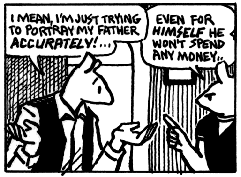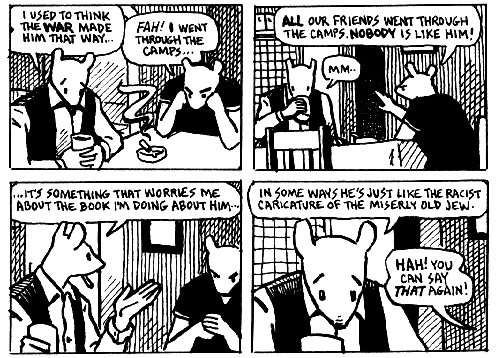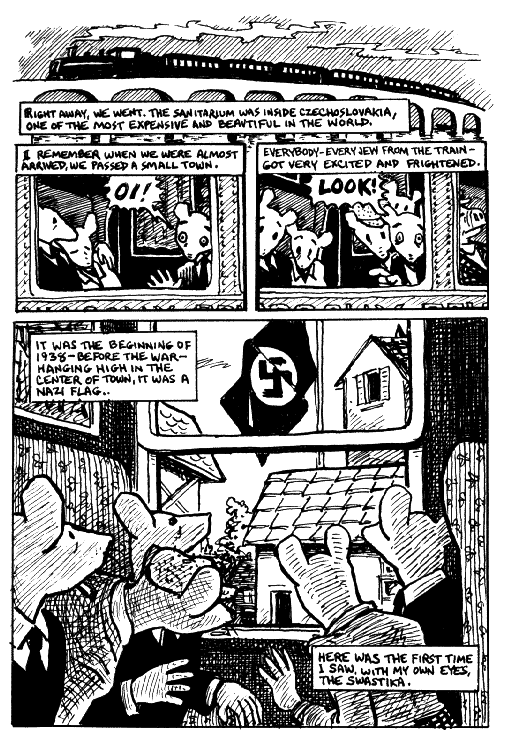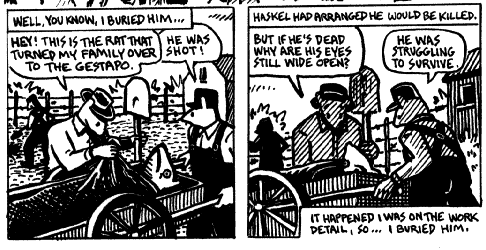

In his graphic novel, Maus: A Survivor's Tale, artist Art Spiegelman takes the comic book form to new heights. Far different than the typical comic book put out by mainstream publishers like Marvel Comics and DC Comics, Spiegelman's work is a gripping tale of his father's struggle to survive as a Jew in Nazi-occupied Europe. Yet at the same time, Maus is also the story of Spiegelman's attempt to come to grips with his father's story in late-twentieth century America. In the resulting work, several fascinating themes develop. These various themes together paint an intriguing glimpse into how various individuals affected by the holocaust either directly or indirectly cope with the tragedy.
Themes:


It is arguable that Vladek survived the holocaust. Though he certainly lived through and beyond it, Vladek's post-holocaust life was forever haunted by the atrocities he witnessed the Nazis commit. Though it is unclear if he was conscious of it, Vladek was a changed man. Spiegelman presents this change by depicting in his work what are really two different characters with the name Vladek--the brave, resourceful young man who struggles to survive, and the miserly, mean-spirited old man who does little but complain.
the flashback sequences, Vladek is consistently portrayed as a quick-witted man with a passionate drive to live. To accomplish this, Vladek performed a number of dangerous and impressive tasks. In volume one, Vladek skillfully manipulates the black market to get enough food for his family. Later, in Auschwitz, he is seen mastering several different trades to appear useful to his overseers. At the camp Vladek impressively works at different times as an English tutor, tinsmith, and shoe maker. Through all the atrocities and losses Vladek never gives up his will to live. This is best represented when he consoles Anja, who has just lost her nephew--the last member of her family. Anja wails that she no longer wants to live, but Vladek responds, "No darling, to die, it's easy...but you have to struggle to live! Until the last moment w most struggle together! I need you!" (Vol. 1, 122).
In contrast, the elderly Vladek telling his story is a
very different man. Vladek complains constantly about his wife Mala, and
is obsessive over money. He is so cheap, that he 
leaves the stove on all day in his cabin in the Catskills so he does not have to waste another match lighting the pilot. Spiegelman, in one of the books few light moments, even depicts Vladek trying to return a bag full of open and partially eaten groceries to the store. Without question, the holocaust is responsible for the severe changes in the demeanor of this man. Vladek himself even admits his compulsive reluctance to waste anything is the product of years of having little. "I cannot forget [the cereal]...ever since Hitler I don't like to throw out even a crumb" (Vol. 2, 78). It is clear that he has also never really gotten over Anja's death.
This is perhaps some of the reason why he is so critical of Maya. For example, at one point in volume one, Vladek takes Art to the bank to go through Vladek's social security box--where he keeps some valuables secret from Mala. There Vladek complains about his wife: "I said, 'Mala, you see how sick I am. . . . What do you want from me?' And she screamed, "I want the money!'. . . Why Artie? Why I ever remarried? Oy, Anja! Anja! Anja!" (Vol. !, 127). Anja killed herself because she could not come to terms with the holocaust. Her death, like the holocaust itself, haunted him all his life.


While Vladek's memoir is an important part of the story, Maus is equally the story of Spiegleman himself trying to come to grips with the holocaust and his father's memories. Yet what makes Maus unique from other holocaust narratives--besides, of course, its form--is how Spiegelman portrays not only his father's story but his own as he struggles to put together Vladek's rambling recollections into a coherent narrative. This is doubly difficult since Art can barely stand being around his difficult father. Hence, throughout the book Art depicts scenes inwhich he implores his father to stick to his tale. For example, early in the first volume, after Vladek characteristically complains about Mala, Art responds, "Please, Pop! I'd rather not hear all that again. Tell me about 1939, when you were drafted" (Vol.1, 44).
Art's attempt to deal with his family's history is portrayed in several ways throughout the work. Spiegelman devotes the most attention to this theme in chapter two of the second volume, "Auschwitz (Time Flies)". With this title Spiegleman links the chapter to chapter one's "Mauswitz". While chapter one depicts Vladek in mouse form arriving and struggling to survive at the concentration camp, chapter two depicts Art struggling cope with the very real horror's of Auschwitz. Indeed, in this chapter Spiegelman does not draw himself as a mouse but as a man wearing a mouse mask--symbolizing his struggle to identify with his father's story. This chapter also allows Spiegelman to take full advantage of the form he has chosen.. For example, on page 42 Spiegelman depicts himself being barraged by the media attention the publishing of the first volume has given him. Through a series of panels, Art is shown shrinking in his chair from the media's questions until he is finally the size of a child. In this diminished form Art goes to see his psychiatrist, Pavel. Pavel consoles him, and on page 46 Art is shown gradually reverting back to adult size. However, on the next page when Art returns to his father's tapes, he quickly shrinks again. Thus in a very visual way Spiegelman represents how he himself felt diminished by his father's tale. It is while feeling this way that Art confides to Pavel that "No matter what I accomplish, it doesn't seem like much when compared to surviving Auschwitz" (44).

Indeed, earlier in volume two Art relates how while growing up he felt that he was in competition with the memory of Richelu--his older brother lost at the age of five or six during the war. This competition was felt despite the fact that Richelu was rarely talked about and that his main presence was a blurry photo in Vladek's bedroom. Complains Art to his wife, "The photo never threw any tantrums or got in trouble. . . it was an ideal kid, and I was a pain in the ass. I couldn't compete" (Vol. 2, 15). This comparison is further accentuated in the ailing Vladek's last sentence in the book--which doubles as the last line of text--in which he mistakenly refers to Art as Richelu: "I'm tired from talking, Richelu, and its enough stories for now" (Vol. 2, 136).


Though Maus is really the story of Vladek and Art, it does offer glimpses into how other survivors dealt with the holocaust as well. Unlike the survivors featured in the Cyber Library of the Holocaust, none of the survivors in Spiegelman's work find it necessary to tell their story as part of the healing process. This, however, could simply be because they were not comfortable enough with Art to tell their stories.
Other than Vladek, there are three other survivors featured in the book. One, of course, is Anja. Art laments throughout the work how he wishes how he could tell her story. Unfortunately, because o the lack of information, Spiegelman is unable to go into a lot of detail on her character. Yet it is evident that she could not deal with the story herself, finally committing suicide in 1968.
Yet even more mysterious is the character of Mala. Mala is herself a survivor, but does not appear to carry around any of the baggage which burdens the Spiegalmans. Instead, throughout the book she is depicted as the brunt of Vladek's abuse. At one point she leaves him, only to return later. It is possible that as survivors, both Vladek and Mala are attracted to each other, despite the fact that they can not stand one another. There is also the possibility that Mala, like many abused women, are naturally attracted to abusers. Having been abused during the holocaust, Mala now subconsciously seeks the emotional abuse of Vladek.

The only other survivor in Spiegelman's work is Pavel, his psychiatrist. Only in one scene, Spiegelman does not really depict how Pavel deals with the memory of Auschwitz. It is clear, however, that these memories have been forever ingrained within him. In one of the more poignant frames of the work, a slumped over Pavel replies to a question from Art asking him if he ever feels guilty over surviving the holocaust. Pavel replies, "No...just sadness" (Vol. 2, 44).

After an examination of these various themes found in Maus, it is questionable why Spiegelman choose to subtitle his work "A Survivor's Tale". In fact, his work is the tale of many survivors. As demonstrated above, it is just as much the tale of Art's struggle with the holocaust as it is Vladek's. And to a lesser extent, it is also the tale of Anja's, Mala's, and Pavel's survival. All of these characters were irreversibly affected by the atrocities of Nazi Germany. The horror's of Auschwitz were too much for any on the characters to escape. Even Art, only the child of a survivor, finds its horror inescapable. Thus, each character must deal with the pain in their own way.

Note: I realize that at times the captions included aren't the ones I'm talking about. Me and the scanner didn't get along!